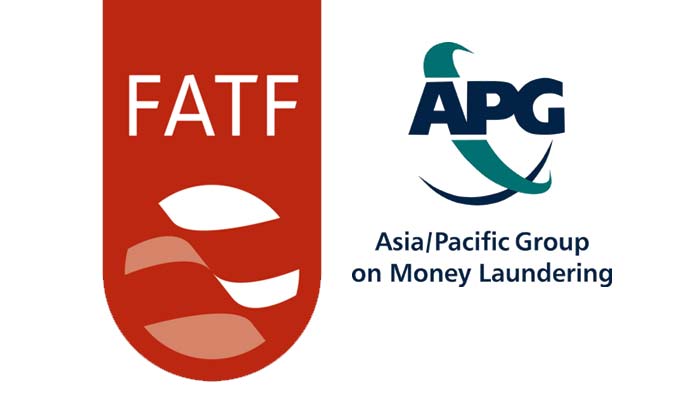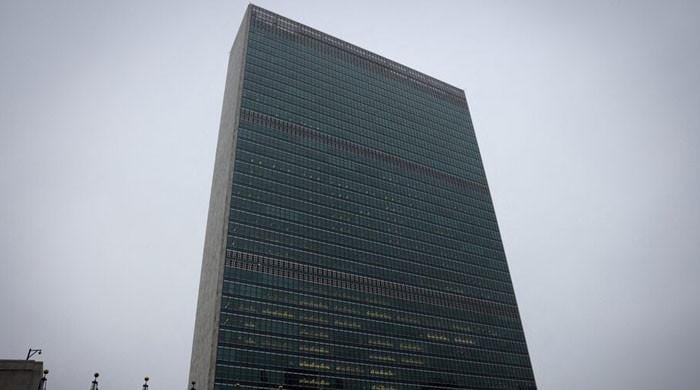Pakistan delegation submits implementation report to FATF Asia Pacific Group
10-member delegation led by Finance Secretary Younas Dagha has informed FATF APG about Pakistan's measures to stop terror financing and money laundering
May 16, 2019

KARACHI: A 10-member Pakistani delegation has presented its implementation report to the Asia-Pacific Joint Group (APG) at a face-to-face meeting Guangzhou, China with officials of the Financial Action Task Force's (FATF) regional affiliate.
Sources told Geo News on Thursday that the delegation led by Finance and Revenue Secretary Mohammad Younas Dagha has informed the APG about Pakistan's measures to stop terror financing and money laundering.
The delegation apprised the APG about measures taken at airports and land and sea border check-posts to curtail currency smuggling. The delegation also informed the group about Pakistan's efforts to curtail activities of banned terrorist outfits and stop monetary transactions linked to them.
Led by the finance secretary, the 10-member delegation defending Pakistan's efforts against money laundering and terror financing includes officials form the Ministry of Foreign Affairs, National Counter Terrorism Authority (NACTA), Financial Monitoring Unit (FMU), Ministry of Interior, Federal Board of Revenue (FBR), State Bank of Pakistan (SBP), Securities and Exchange Commission of Pakistan (SECP), and the Federal Investigation Agency (FIA).
Pakistan has already submitted a report informing the APG of the actions it has taken against proscribed organisations and to strengthen its systems in order to block flow of funds that may be used in terrorist activities.
In October, the FATF Asia Pacific Group had demanded more action from Pakistan to put an end to money laundering and financial assistance to terrorists.
Following a meeting in Paris in June last year, the Paris-based organisation formally included Pakistan on its "grey list" of countries with inadequate controls over curbing money laundering and terrorism financing.
The organisation can make recommendations to any of the countries that have signed a membership charter, as well as other nations, but it has no power to impose sanctions.
According to officials, Pakistan had until May to ensure implementation on the measures laid down by FATF.
FATF action plan objectives
The action plan given to Pakistan to address its 'strategic deficiencies' included the following measures:
1. Adequately demonstrating its proper understanding of the TF risks posed by the terrorist groups above, and conducting supervision on a risk-sensitive basis.
2. Demonstrating that remedial actions and sanctions are applied in cases of AML/CFT violations, and that these actions have an effect on AML/CFT compliance by financial institutions.
3. Demonstrating that competent authorities are cooperating and taking action to identify and take enforcement action against illegal money or value transfer services (MVTS).
4. Demonstrating that authorities are identifying cash couriers and enforcing controls on illicit movement of currency and understanding the risk of cash couriers being used for TF.
5. Improving inter-agency coordination including between provincial and federal authorities on combating TF risks.
6. Demonstrating that law enforcement agencies (LEAs) are identifying and investigating the widest range of TF activity and that TF investigations and prosecutions target designated persons and entities, and persons and entities acting on behalf or at the direction of the designated persons or entities.
7. Demonstrating that TF prosecutions result in effective, proportionate and dissuasive sanctions and enhancing the capacity and support for prosecutors and the judiciary; and
8. Demonstrating effective implementation of targeted financial sanctions (supported by a comprehensive legal obligation) against all 1267 and 1373 designated terrorists and those acting for or on their behalf, including preventing the raising and moving of funds, identifying and freezing assets (movable and immovable), and prohibiting access to funds and financial services;
9. Demonstrating enforcement against TFS violations including administrative and criminal penalties and provincial and federal authorities cooperating on enforcement cases.
10. Demonstrating that facilities and services owned or controlled by designated person are deprived of their resources and the usage of the resources.











